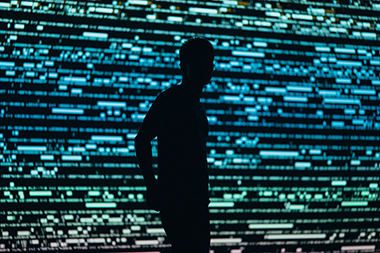Thomas Bass Draws an Unsettling Portrait of a Post-Privacy World

By nature, Americans resist invasions of our privacy even from our neighbors, but especially when the snoopers are from government or the corporate world.
But now, writes professor of English and noted journalist and author Thomas Bass in an article for The American Scholar, we are getting very used to autonomous agents scrutinizing our lives, both inside and out.
“The desired end to this surveillance is total information awareness,” writes Bass in the August cover story of the publication, which is the quarterly literary magazine of the Phi Beta Kappa Society. “At first, we resisted this project, but in the era of pandemics, environmental war, and randomized terror, we are learning to embrace surveillance as a new form of social media.”
In a piece that meticulously reveals the staggering growth and comprehensiveness of surveillance tools since 9/11, as well as the fascinating history of human surveillance through technology extending back to the Civil War, Bass weaves a tale that has to leave most of us very uneasy. He notes, for instance, that, by the end of the next decade, there may be a trillion sensors operating on the surface of Earth gathering information on us.

“Our smartphones, augmented reality glasses, robots, medical wearables, and 'smart dust' embedded with computers will total 50 billion connected devices — most of them talking not to us but to each other,” he writes. Inside our bodies and out, “our smartphones will be live streaming our daily existence.”
He writes that China leads all other nations in not only collecting data on its citizens but in controlling them through surveillance, with, for instance, close to 200 cameras per thousand citizens in Chongqing, which has a population of more than 8.5 million, “leaving virtually no public space free of scrutiny.”
How does Bass look at the city of San Francisco, which tried to fight against this tide in May 2019 by banning facial recognition devices? This is largely symbolic, he writes: “San Franciscans are already digitized, tracked, profiled, and otherwise inscribed into the vast network of credit scores, game playing, policing, censoring, and commerce that make up the panopticon of modern life.”
What is the way out of this snoopily brazen new world? Bass doesn’t offer one. “If a journalist is good enough to describe what's going on, this doesn't mean that he or she can predict how one gets from point A to point B,” he said. “Regarding surveillance, we're in an arms race. The surveyors develop new technology and the surveyed learn how better to disguise their activities.”
Bass noted that, in a sense, he has been researching this American Scholar article and the power of surveillance since the late 1970s, when he joined a group of physicists who were building toe-operated computers into shoes “to knock off the roulette tables in Las Vegas,” an enterprise he wrote about in his book The Eudaemonic Pie.
“Countering eye-in-the-sky casino surveillance was a big part of the project,” he said, adding that his team “developed a variety of disguises for hiding what we were doing. We were good, and we were lucky, but if we hadn't been good and lucky we could have ended up at the bottom of Lake Mead wearing concrete shoes.”




